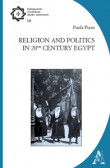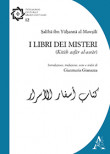

Patrimonio Culturale Arabo Cristiano
Testi, saggi e traduzioni
Testi, saggi e traduzioni
| Direttore | Khalil Kussaim Samir |
| Comitato scientifico | Paola Pizzi, Paola Pizzo, Davide Righi, Salvatore Santoro |
Nel momento in cui la lingua araba acquistò una rilevanza letteraria per i cristiani d’Oriente, spettò prima di tutto ai Melchiti dotare il nuovo genere di una propria letteratura religiosa, che non consistesse soltanto in traduzioni dei testi antichi del periodo ortodosso precedente ma anche in opere autonome. Georg Graf
Non c’è un errore nel titolo di questa serie. Molti saranno sorpresi nel leggere affiancate le parole «cristiani» e «arabi». Eppure nel giorno della Pentecoste ci sono degli Arabi che si fanno battezzare (At 2,11). In seguitodiverse tribù arabe si convertono al cristianesimo, inventano la scrittura araba e danno all’Arabia i suoi primi regni, ben prima della comparsa dell’islam. I cristiani arabi hanno raccolto l’eredità scientifica e filosofica dei Greci. I califfi musulmani li hanno chiamati alla corte di Damasco e poi a Baghdad per farne i loro medici privati e i loro accreditati consiglieri. Ci hanno trasmesso le opere mediche di Ippocrate e Galeno, quelle filosofiche di Platone, di Aristotele e dei loro continuatori, quelle scientifiche di Euclide e Tolomeo. Sono stati i continuatori della ricerca dei Greci e gli artefici della grande rinascita araba del X secolo che, a partire dal XII, è filtrata lentamente in Occidente.La collana è stata creata al fine di far conoscere la cultura dei cristiani arabi. È promossa da una trentina di ricercatori che dal 1999 hanno dato vita all’associazione «Gruppo di Ricerca Arabo-Cristiana» (GRAC) (www.grac.it). Samir Khalil Samir
Tutti i volumi di questa collana, promossa dal Gruppo di Ricerca Arabo-Cristiana, sono sottoposti alla procedura di peer review.
At a time when the Arabic language acquired a literary significance for Eastern Christians, it was first of all for the Melkites to endow the new genre with its own religious literature, which consisted not only of translations of the ancient texts of the previous Orthodox period but also of autonomous works. Georg Graf
There is nothing wrong with the title of this new series of studies. Although many people may be surprised in seeing the words Arab and Christian in the same sentence, Arabs were present at the first Pentecost and received the baptism of the Holy Spirit (Acts 2:11). Later some Arab tribes accepted Christianity, invented the Arabic script, and formed the first kingdoms in the Arabian Peninsula long before the rise of Islam.
After the rise of Islam, other Middle Eastern Christian communities, Syriac, Melkite, and Coptic, also came to be «Arabized» to a significant degree. A Christianity inspired by the Fathers of the Church but thinking in Arabic grew up in this environment. It re-examined the Christian heritage as it came into contact with a new religion, Islam, and for the first time Christians weighed their beliefs against those of another faith.These Christians preserved and synthesized the scientific and philosophic inheritance of the Hellenic world and because of this the Muslim Caliphs of Baghdad and Damascus sought them out as court physicians and councilors. They transmitted this treasure, through translations and commentaries on the medical treatises of Galen and Hippocrates, the philosophy of Plato, Aristotle, and their disciples, and the scientific works of Euclid and Ptolemy. They were students of Greek learning and they began in the 9th century a renaissance in the Arab world that three centuries later spread to the West.Beginning in the 16th century, these Arab Christians came to study in the West and when they returned home they built modern colleges in Lebanon, founded printing houses, and disseminated the methodology of the scientific revolution. As they brought learning from the west to the east so also they became in the 17th and 18th centuries the first Orientalists, introducing Westerners to Middle Eastern culture, both Christian and Muslim. In the 19th century, they were the first promoters of the nahda, a second Arab renaissance, starting newspapers and other publications, reviving theatre, novels, and later the cinema.Even so, these Arab Christians, being no less Arab than their Muslim counterparts, were not taken seriously in the Western world. In the endless fascination with all that was «different», they were dismissed as «charming» and «exotic». Because their faith was so similar to that of the West, because they were so oppressed by their Ottoman overlords, and because they were so few in numbers, they were ignored by Western intellectuals, attracting the attention only of those missionaries that sought to «evangelize» them.In order to remedy this serious gap of knowledge about the Arab Christian world, the present series, The Treasures of Arabic Christian Culture is being offered to scholars and interested readers in Italy and all over the World.It is promoted by about thirty researchers who have given birth to the association «Arab-Christian Research Group» since 1999 (GRAC: www.grac.it). Samir Khalil Samir
Non c’è un errore nel titolo di questa serie. Molti saranno sorpresi nel leggere affiancate le parole «cristiani» e «arabi». Eppure nel giorno della Pentecoste ci sono degli Arabi che si fanno battezzare (At 2,11). In seguitodiverse tribù arabe si convertono al cristianesimo, inventano la scrittura araba e danno all’Arabia i suoi primi regni, ben prima della comparsa dell’islam. I cristiani arabi hanno raccolto l’eredità scientifica e filosofica dei Greci. I califfi musulmani li hanno chiamati alla corte di Damasco e poi a Baghdad per farne i loro medici privati e i loro accreditati consiglieri. Ci hanno trasmesso le opere mediche di Ippocrate e Galeno, quelle filosofiche di Platone, di Aristotele e dei loro continuatori, quelle scientifiche di Euclide e Tolomeo. Sono stati i continuatori della ricerca dei Greci e gli artefici della grande rinascita araba del X secolo che, a partire dal XII, è filtrata lentamente in Occidente.La collana è stata creata al fine di far conoscere la cultura dei cristiani arabi. È promossa da una trentina di ricercatori che dal 1999 hanno dato vita all’associazione «Gruppo di Ricerca Arabo-Cristiana» (GRAC) (www.grac.it). Samir Khalil Samir
Tutti i volumi di questa collana, promossa dal Gruppo di Ricerca Arabo-Cristiana, sono sottoposti alla procedura di peer review.
At a time when the Arabic language acquired a literary significance for Eastern Christians, it was first of all for the Melkites to endow the new genre with its own religious literature, which consisted not only of translations of the ancient texts of the previous Orthodox period but also of autonomous works. Georg Graf
There is nothing wrong with the title of this new series of studies. Although many people may be surprised in seeing the words Arab and Christian in the same sentence, Arabs were present at the first Pentecost and received the baptism of the Holy Spirit (Acts 2:11). Later some Arab tribes accepted Christianity, invented the Arabic script, and formed the first kingdoms in the Arabian Peninsula long before the rise of Islam.
After the rise of Islam, other Middle Eastern Christian communities, Syriac, Melkite, and Coptic, also came to be «Arabized» to a significant degree. A Christianity inspired by the Fathers of the Church but thinking in Arabic grew up in this environment. It re-examined the Christian heritage as it came into contact with a new religion, Islam, and for the first time Christians weighed their beliefs against those of another faith.These Christians preserved and synthesized the scientific and philosophic inheritance of the Hellenic world and because of this the Muslim Caliphs of Baghdad and Damascus sought them out as court physicians and councilors. They transmitted this treasure, through translations and commentaries on the medical treatises of Galen and Hippocrates, the philosophy of Plato, Aristotle, and their disciples, and the scientific works of Euclid and Ptolemy. They were students of Greek learning and they began in the 9th century a renaissance in the Arab world that three centuries later spread to the West.Beginning in the 16th century, these Arab Christians came to study in the West and when they returned home they built modern colleges in Lebanon, founded printing houses, and disseminated the methodology of the scientific revolution. As they brought learning from the west to the east so also they became in the 17th and 18th centuries the first Orientalists, introducing Westerners to Middle Eastern culture, both Christian and Muslim. In the 19th century, they were the first promoters of the nahda, a second Arab renaissance, starting newspapers and other publications, reviving theatre, novels, and later the cinema.Even so, these Arab Christians, being no less Arab than their Muslim counterparts, were not taken seriously in the Western world. In the endless fascination with all that was «different», they were dismissed as «charming» and «exotic». Because their faith was so similar to that of the West, because they were so oppressed by their Ottoman overlords, and because they were so few in numbers, they were ignored by Western intellectuals, attracting the attention only of those missionaries that sought to «evangelize» them.In order to remedy this serious gap of knowledge about the Arab Christian world, the present series, The Treasures of Arabic Christian Culture is being offered to scholars and interested readers in Italy and all over the World.It is promoted by about thirty researchers who have given birth to the association «Arab-Christian Research Group» since 1999 (GRAC: www.grac.it). Samir Khalil Samir

SINTESI
PUBBLICAZIONI












